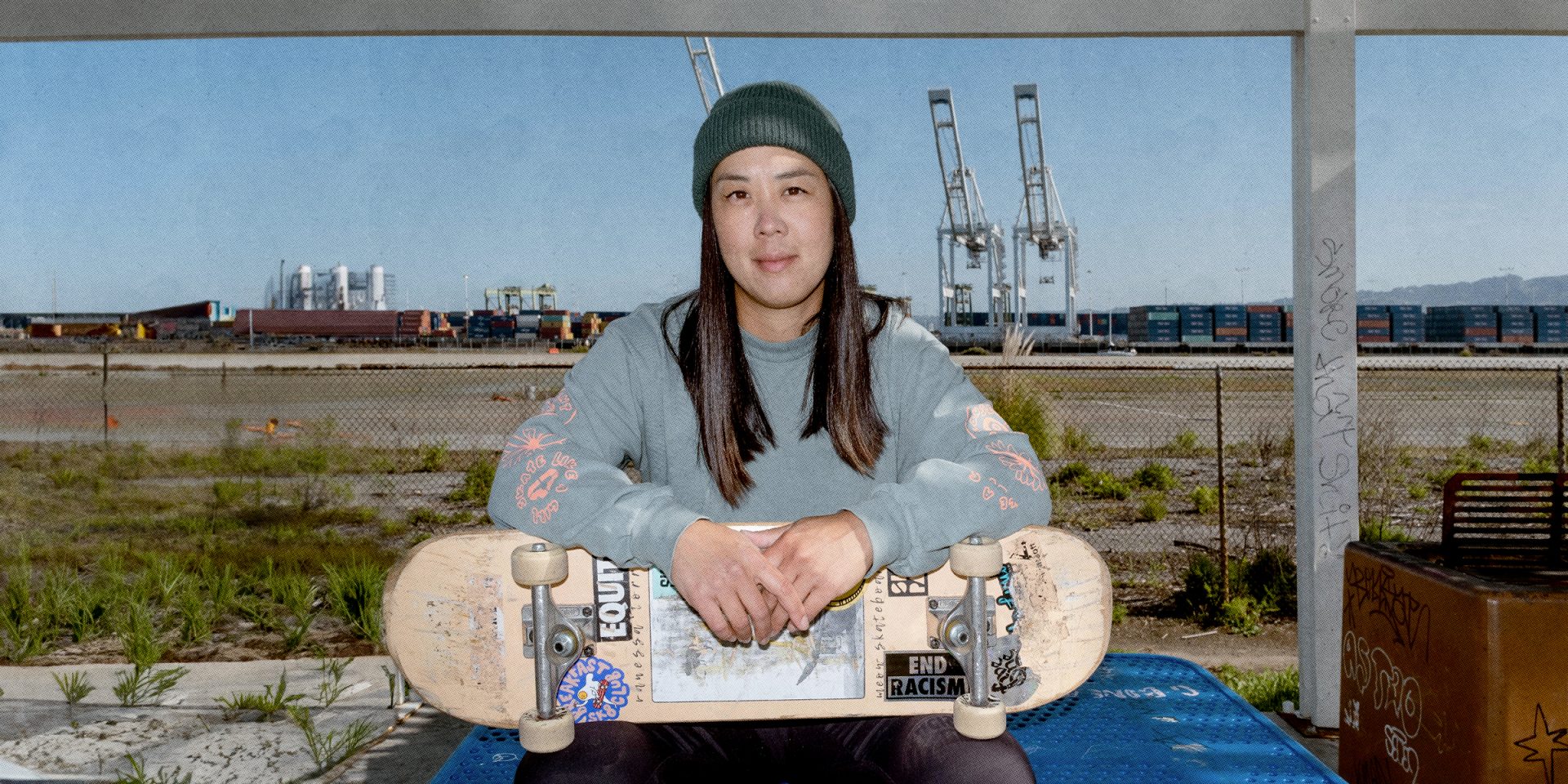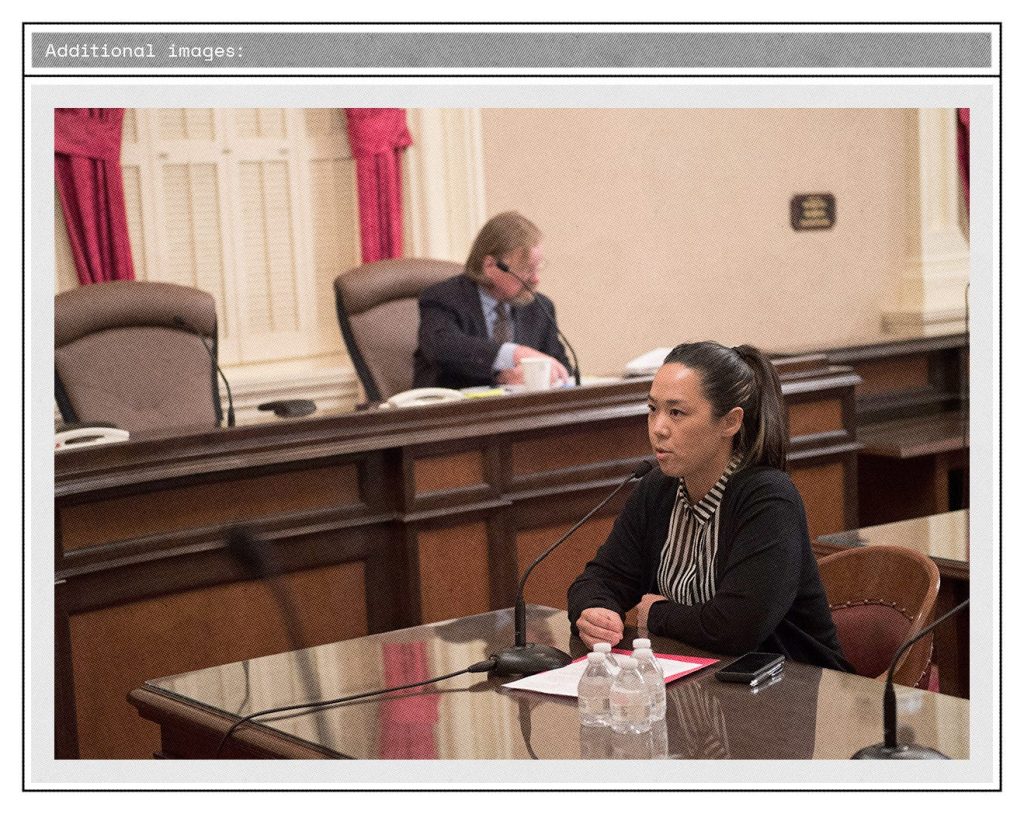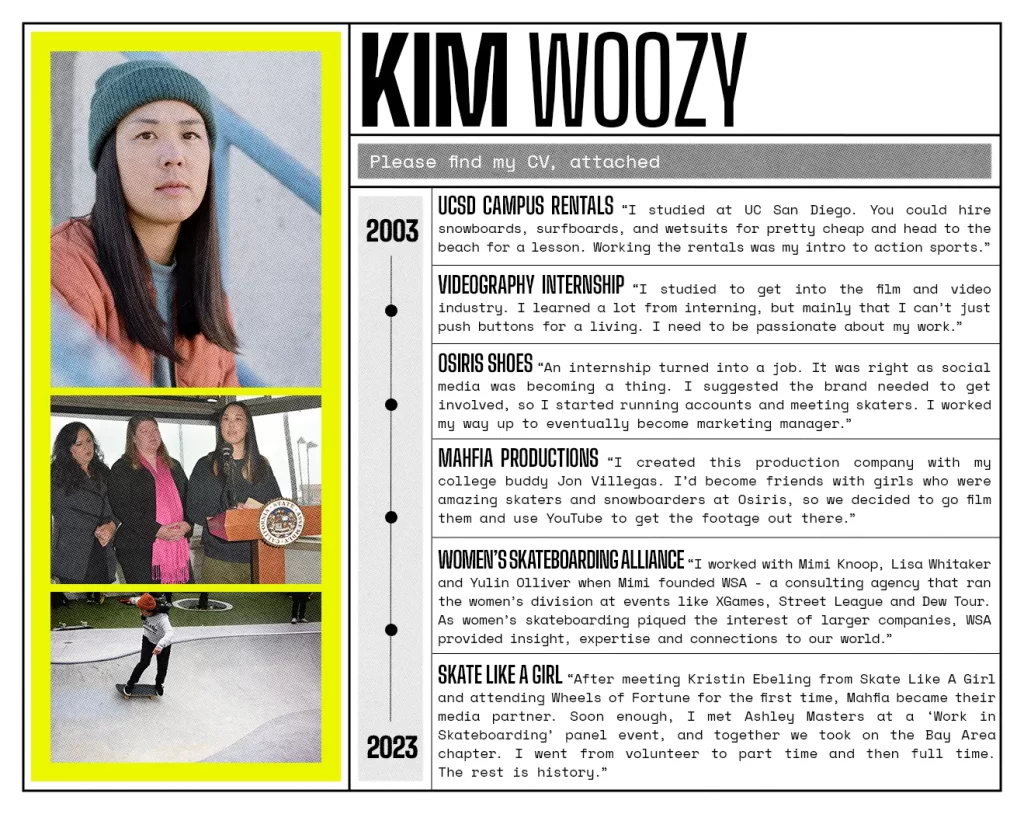ACM’s Outsider Insiders: Kim Woozy

She may be leading the way to equality in action sports, but don’t call the Skate Like A Girl director a game changer…
At this very moment, it would be really convenient if we hadn’tmade such a big deal of our dislike for wafty industry jargon. Phrases like “icon” and “legend” and “change maker” have earned alarm emojis whenever they’ve been used in our team basecamp chat. We’ve banned “I hope you’re well” from our media releases. And we haven’t been “thrilled to announce” a new client for ages.
But right now, on a delayed and inspiration-sapping train back from Bristol to Cornwall, dropping a “game changer!” to describe Kim Woozy would be as timesaving as it would be genuinely accurate. Thanks for nothing, rival agencies.
The editorial team at Sports Illustrated were probably suffering a similar dilemma when coming up with the title for their June 2022 issue. “Game Changers” would’ve been a bang-on double-meaning description of an entire mag celebrating to the tireless grafters – including Kim – pushing the equality in sports conversation forward. Did “Torch Bearers” manage it? Well, yeah, but you can still imagine it in your least favourite colleague’s new LinkedIn update too, right?
Kim Woozy’s inspirational fist-in-the-air work is the kind of seismic culture shaking that beige-shirted marketeers want to ride on when they use “game changer” to describe any tin-pot product they want to flog. Or worse: themselves. Bleurgh.
In the last 15+ years, she has empowered and inspired women and girls in action sports by:
- Founding a platform dedicated to filming and broadcasting women’s skate content.
- Becoming a member of the Gender Equality Commission for World Skate – the global governing body for Olympic skateboarding.
- Advocating for the Equal Pay For Equal Play bill in California (which was signed into actual American law in 2020 and requires equal prize money for all state comps).
- Managing a women’s skate team for one of the world’s most famous skate shoe brands.
- Giving women and trans people the courage to take up space in skateboarding, in her role as director of marketing at Skate Like A Girl.
- Investing her endless energy and time into public speaking, consultancy, podcasts, founding her own brands, and stacks more that make her the beanie-toting portrait of an ACM Outsider Insider.

It’s no surprise, then, that for our hour-plus chat with Kim, we’ve needed to nab her during an out-of-office American holiday. And when she told us about her “retirement plans”, we weren’t exactly shocked…
People would ring the Osiris office every single day asking for us to bring back the D3. When I was interning there, I answered the phones while the receptionist was on maternity leave. This was, like, years after the shoes went out of production, but I still had to apologise for Osiris no longer making them.
I reckon it’s the weather that’s made the Pacific Northwest – the Northern California, Seattle, Portland, Vancouver area – so progressive when it comes to inclusivity. The longer nights and colder days make people more focused on their minds. If you’re in California you can be outside working on your tan, but further up the coast you’re forced inside to read more books and watch more films. I think that’s where the exploration and sharing of different cultures happens. That’s my very basic theory, anyway.
I can’t imagine the punk DIY riot girrrl or grunge subcultures could have happened in blazing California sunshine.
Skate Like A Girl’s HQ is in Seattle. We’ve got three chapters: Seattle, Portland, and the Bay area. The first time I joined one of their meetups was the first time I actually felt invited to skate.
You don’t realise the impact that media representation can haveuntil you experience it. As a kid, seeing figure skater Kristi Yamaguchi on TV was a huge moment for me. It was like, “She’s doing that, and she looks like me?”.
When Vanessa Torres and Amy Caron were coming up, most brands weren’t interested in sponsoring women. A lot of women skaters preferred wearing guy clothes at a time when Blue Crush, Roxy girls, and Reef bikini ads were everywhere. Girls had to be feminine and pretty to be marketable in action sports. If you weren’t, brands would either ask you to change or just not consider you.
Self-publishing was the shift. Before social platforms, you’d have to search hard to find a girl or woman in a skateboarding magazine. But girls grabbing their GoPros or cell phones and uploading skate footage to YouTube or Instagram helped a new wave, like Lizzie Armanto and Nora Vasconcellos, come to the top. They weren’t marginalised. They didn’t feel pressured to be like guy skaters because they had girl skaters to look up to, and therefore more possibility models, period. The more types of people you saw on Instagram skating, the more you felt like it didn’t matter who you were or what you looked like in order to be a skateboarder.
I remember Leticia Bufoni skating in a sports bra and leggings and getting loads of criticism for it. Now it feels like the more different you are, the cooler you are. I think that’s so great.
You can’t not smile if you’re going fast.
I’ve started mentoring people, just on the side. Just friends and younger women that I know and are in the action sports industry. I really believe mentorship is a way we can bring more women and trans people into leadership roles.
Mentorship really matters.
Diversity at a leadership level will breed diversity in our culture. That’s not rocket science, but we need a more formal structure to get different people in the room. To empower those that don’t have the connections or friends to help them get a foot in the door.
Hey, I’m pretty tired. I’d quite like to retire one day. My friends and I, if we don’t start closing the gaps soon, we’re gonna still be the only ones doing our jobs. My dream is to pass on everything I know. To pass the baton on.
I know the right people are out there. For every one girl who comes up to me at an event and wants to talk, I know there are ten others that either didn’t have the confidence to stop me, didn’t have the money to make it over, or didn’t have a friend to come down with.
A big part of being a mentor is knowing you don’t have all the answers. You can’t tell someone what to do, but you can share your own experiences and pathways. There’s a huge difference between speaking to an expert and someone who’s got lived experience.
Effective leadership is telling people what they need to hear, not what they want to hear.
A mentor isn’t necessarily trying to make someone feel better. For me, I’m just trying to give someone the space to remove the things that are weighing them down or in their way. I want to give them more freedom to figure out a way to achieve what they want to do.
There’s a bit of structure in the calls I do with a mentee. We usually start with what’s on their mind and what they want to get off their chest. Then we work through something they’re currently working on, whether that’s in work or life, and locate barriers they could face along the way. After that, it’s goals for the coming days, weeks, months. I keep a track of them all and we revisit them regularly. But there is always space to just riff and unload, if that’s what they need.
I could name every non-cis-male filmmaker and videographer who’s ever been paid for work on one hand. We’ve got Rey Choto, Monique O’Toole, Lisa Whitaker, and Shari White, and Hannah Bailey is doing some great stuff in the UK. But given how far the participation rate has grown for women, I should have a Rolodex filled with names.
If we get a greater level of diversity behind the camera, and at every level of storytelling, we will capture more diverse skating, and progression and participation will just skyrocket.
Action sports culture is mysterious. Breaks into the industry are hard to find and can seem intimidating to chase down. By mentoring the next generation, we can show them it’s not as scary and gatekept as it might seem.
Our culture is still young. A lot of us within it are starting to approach a time in our lives when we can be valuable mentors. We’re no longer headless 22-year-olds.
Kim Woozy: A Résumé
Ever wondered what kind of work experience gets you a top job in the outdoors? Here’s one way of doing it…
